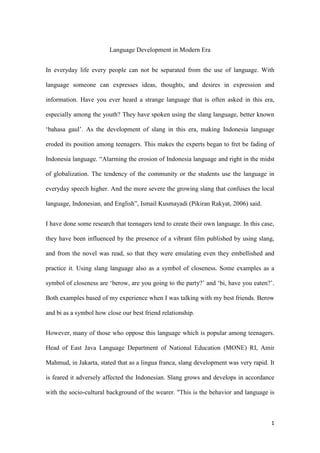Dwi augina hamid research ccu
- 1. Language Development in Modern Era In everyday life every people can not be separated from the use of language. With language someone can expresses ideas, thoughts, and desires in expression and information. Have you ever heard a strange language that is often asked in this era, especially among the youth? They have spoken using the slang language, better known ŌĆ×bahasa gaulŌƤ. As the development of slang in this era, making Indonesia language eroded its position among teenagers. This makes the experts began to fret be fading of Indonesia language. ŌĆ£Alarming the erosion of Indonesia language and right in the midst of globalization. The tendency of the community or the students use the language in everyday speech higher. And the more severe the growing slang that confuses the local language, Indonesian, and EnglishŌĆØ, Ismail Kusmayadi (Pikiran Rakyat, 2006) said. I have done some research that teenagers tend to create their own language. In this case, they have been influenced by the presence of a vibrant film published by using slang, and from the novel was read, so that they were emulating even they embellished and practice it. Using slang language also as a symbol of closeness. Some examples as a symbol of closeness are ŌĆ×berow, are you going to the party?ŌƤ and ŌĆ×bi, have you eaten?ŌƤ. Both examples based of my experience when I was talking with my best friends. Berow and bi as a symbol how close our best friend relationship. However, many of those who oppose this language which is popular among teenagers. Head of East Java Language Department of National Education (MONE) RI, Amir Mahmud, in Jakarta, stated that as a lingua franca, slang development was very rapid. It is feared it adversely affected the Indonesian. Slang grows and develops in accordance with the socio-cultural background of the wearer. "This is the behavior and language is 1
- 2. universal," he added. Slang language also resulted in fading local languages that exist in each region. Teens felt ashamed when they have to speak using their local language, just because they think that now is the modern era, they competed in giving themselves in slang language. This is an important concern for the government to Indonesian defense. One of the sites I have found, was introduced ŌĆ×watch Wayang in Indonesia languageŌƤ. Wayang already famous in Indonesia, and we have known that wayang delivered by Java language. In my view, aired wayang in Indonesia language is incredible and strenghthen the use of Indonesia language for our daily life. ŌĆ£There are a negative and positive impact about the growing languange. The negative impact is fading Indonesian regional language especially among teens, while the positive impact is that there are variations in the language (Tami Saosang, 20 years in age, one of the instructure in My Liberty Course Gorontalo)ŌĆØ. The usage of Indonesia language in daily life began to shift replaced by the use of language, known as teen slang. Interference slang sometimes arise in the use of the Indonesian language in official circumstances which resulted in the use of language that is not good and not right. Meanwhile, slang language as a creativity in language among teens. As revealed by Oemarjati that as a source of enrichment Indonesian (within the meaning of new vocabulary), teen slang obviously more creative, more agile and pleasant than outright borrowing foreign terms. 2
- 3. Bibliography Yurnaldi. (2010). Menonton wayang dalam bahasa Indonesia. Retrieved November 10, 2012, from Kompas.com: http://oase.kompas.com/read/2010/07/22/22362554/Menonton.Wayang.dalam.Bahasa.I ndonesia (Editor), A. (2009). Bahasa prokem bisa perburuk bahasa Indonesia. Retrieved November 10th, 2012, from Kompas.com: http://oase.kompas.com/read/2009/06/25/12021667/Bahasa.Prokem.Bisa.Perburuk.Baha sa.Indonesia Saosang, T. (2012, November 17th). Language development in modern era. (D. A. Hamid, Interviewer) Yudono, J. (2009). Bahasa gaul tantangan berat bahasa Indonesia. Retrieved November 12th, 2012, from Kompas.com: http://oase.kompas.com/read/2009/10/15/22135929/Bahasa.Gaul.Tantangan.Berat.Peng embangan.Bahasa.Indonesia Oktora, S. (2009). Bahasa Indonesia makin kuat, bahasa daerah gonjang-ganjing. Retrieved November 13th, 2012, from Kompas.com: http://edukasi.kompas.com/read/2009/12/17/16043677/Bahasa.Indonesia.Makin.Kuat..B ahasa.Daerah.Gonjang-Ganjing 3
- 4. 4




